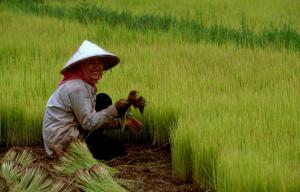The effects of growing rice in low water and high salt conditions

Copyright : Oliver Spalt C.C (Wikimedia)
Rice is a staple food across Asia, with both people and economies reliant on its successful harvest. One paper finds that low water input does not affect rice growth as much as the levels of nutrients in soil can, and the second suggests that, although rice is seriously stressed by high salt levels in soil, this can be countered by the application of locally produced compost.
Approximately 576 million tonnes of rice are produced globally each year, with about 90% produced and consumed in Asia.
75% of the world's rice is grown in irrigated lowlands, and with water for agriculture becoming increasingly scarce, the question of the effect of low water levels on rice growth is becoming more critical. Jahan, M. S. and colleagues at the Faculty of Agriculture at Universiti Putra Malaysia, set out to determine the effect, on both rice production and the chemical properties of the soil in which rice grows.
They found that iron content in soil slowly increases as rice is growing, but even more so after water is drained off. Manganese, on the other hand, increased sharply after flooding, but decreased after that. They found that water levels did not affect the growth of rice as much as expected.
Their results provide recommendations for water management as saturation throughout the cultivation process does not seem to be as important as is believed. Low water input rice production could be implemented and fresh water saved for other sectors.
In a second paper in the same issue, Muhammad Ibrahim and colleagues from Pakistan’s University College of Agriculture and Government College University as well as the South Korea’s National Academy of Agricultural Science, looked at salt levels in soil and the effect on rice growth.
They took twenty day old rice plants and transplanted them into clay pots filled with either normal or saline soil. They found that the saline soil had a significant effect on the growth of the rice, but when they applied compost the results improved.
Further work is needed to optimise the compost mixture and resulting growth but their work provides hope for many poor rice farmers as compost can be locally made and produced from a variety of waste materials.
For more information, contact
Growing rice in low water levels
Jahan, M. S.
Department of Land Management
Faculty of Agriculture
Universiti Putra Malaysia
43400 Serdang, Selangor
Malaysia
Email: sarwarjahan@unisza.edu.my
Effects of saline soil on rice
Muhammad Ibrahim
Department of Agricultural Environment
National Academy of Agricultural Science
Rural Development Administration (RDA)
Suwon (441-707), South Korea
Email: Ibrahim@rda.go.kr
About Pertanika Journal of Tropical Agricultural Science (JTAS)
Pertanika Journal of Tropical Agricultural Science (JTAS) is published by Universiti Putra Malaysia in English and is open to authors around the world regardless of nationality. It currently publishes four times a year in February, May, August and November. Other Pertanika series include Pertanika Journal of Science & Technology (JST), and Pertanika Journal of Social Sciences & Humanities (JSSH).
JTAS aims to provide a forum for high quality research related to tropical agricultural research. Areas relevant to the scope of the journal include: agricultural biotechnology, biochemistry, biology, ecology, fisheries, forestry, food sciences, entomology, genetics, microbiology, pathology and management, physiology, plant and animal sciences, production of plants and animals of economic importance, and veterinary medicine. The journal publishes original academic articles dealing with research on issues of worldwide relevance.
For more information about the journal, contact:
The Chief Executive Editor
Journal Division
Office of the Deputy Vice Chancellor (R&I)
IDEA Tower 2, UPM-MDTC Technology Centre
Universiti Putra Malaysia
43400 Serdang, Selangor
Malaysia.
Phone: + (603) 8947 1622 | + (6) 016 217 4050
Email: nayan@upm.my
Acknowledgements
The Chief Executive Editor, UPM Journal
Associated links
Journal information
Jahan, M.S., Khanif, Y.M., Syed Omar, S.R. and Sinniah, U.R. (2013) Effects of Low Water Input on Rice Yield: Fe and Mn Bioavailability in Soil. Pertanika Journal of Tropical Agricultural Sciences 36 (1): 27-34.
Mukkram Ali Tahir, Muhammad Ibrahim, Ghulam Sarwar, Yasir Iftikhar, Sang-Keun Ha, Kyung-Hwa Han and Yong-Seon Zhang (2013) Impact of Indigenous Industrial Compost on the Growth of Coarse and Fine Rice Varieties under Saline Environment. Pertanika Journal of Tropical Agricultural Sciences 36 (1): 61-70.
Media Contact
All latest news from the category: Agricultural and Forestry Science
Newest articles

Properties of new materials for microchips
… can now be measured well. Reseachers of Delft University of Technology demonstrated measuring performance properties of ultrathin silicon membranes. Making ever smaller and more powerful chips requires new ultrathin…

Floating solar’s potential
… to support sustainable development by addressing climate, water, and energy goals holistically. A new study published this week in Nature Energy raises the potential for floating solar photovoltaics (FPV)…

Skyrmions move at record speeds
… a step towards the computing of the future. An international research team led by scientists from the CNRS1 has discovered that the magnetic nanobubbles2 known as skyrmions can be…





















